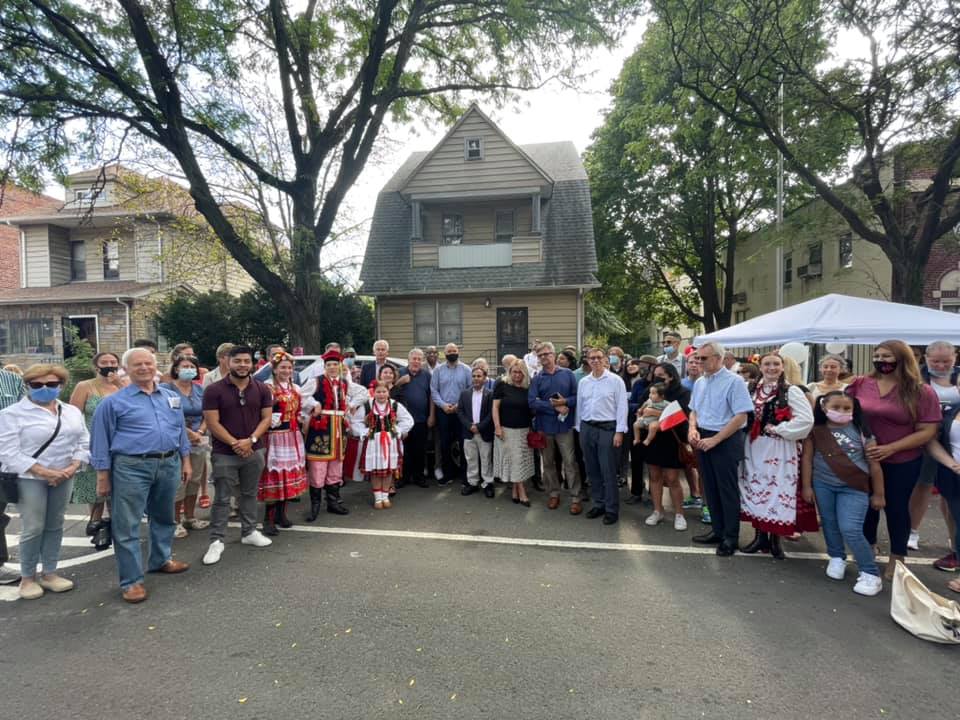A street co-naming at 43rd Avenue and Judge Street in Elmhurst took place on September 18th in honor of Aleksander and Walentyna Janta-Polczynski, a Polish couple who lived in the home at this intersection, and were noted for their heroism during WW2, and afterwards as lifelong humanitarians. In summary, Aleksander was a famed international journalist, poet, and an active member of resistance, who was wounded, captured, and escaped. Once in America, he arranged the return of the Wawel treasures back to Poland, which had been held in Canada during the war’s duration. Walentyna was intelligence, assistance to General Wikorski, Polish Government in Exile, transcribed reports from inside Poland, communicated with the spy network, operated underground radios to provide up to date knowledge of the war, and was present at the Nuremburg trials. The couple’s home in Elmhurst later served as a bastion of activity, hosting scholars, intellectuals, politicians, and the military; with Aleksander and Walentyna devoting much of their time towards elevating a new generation’s educational pursuits and endowments. (See Juniper Berry Fall and Winter 2020 Issue articles for further details and the push to preserve their house.) The event initiated by the Elmhurst History and Cemetery Preservation Society, was hosted by Councilman Danny Dromm and staff, who sanctioned getting this sign installed, and organized the event along with EHCPS. Luke O’Brien of EHCPS said, “I am very glad to see the Jantas honored, as it important to recognize those who stood up to totalitarian aggression, and fought for human rights.”
The mood on this event day was joyous, as a crowd of about sixty gathered on 43rd Avenue. Queens Borough President Donovan Richards joined Councilman Dromm, and Councilman Bob Holden, whose own district is home to many of Polish ethnicity. The National anthems of the U.S and Poland were sung by Camila Noguera and Patrycja Posluszna respectively. EHCPS members Marialena Giampino (also Community Board 4 chair) James McMenamin, and Jennifer Ochoa spoke on the Jantas’ legacy, and their group’s ongoing efforts to preserve the house, which remains stand- ing, although it’s future is still cloudy while awaiting a decision from the Landmarks Preservation Commission. Holocaust survivor and educator Sally Frishburg spoke passionately, followed by Preservationist Kelly Carroll, and Alfonso Quiroz, both part of the team who did filming and brought media attention and recognition to the Janta couple and to the home they bought in 1959, and in which Ms. Janta remained until her death in 2020, at the age of 107. The principal of a school named for the Jantas, Kasia Pawka, based in Lakewood, New Jersey, addressed the crowd, and attended with a sizable number of students clad in traditional Polish attire. The event followed with poems read by Chris Pieczynski, authored by the renowned Czeslaw Milosz. Elmhurst native Karen Serafinko said, “It’s important for community to have these kinds of events because they are positive and uplifting. Lifelong residents may be totally unaware of important historic events or individuals who have contributed greatly to the fabric of history and to the development of their community.”
Following the sign unveiling, pierogi, kielbasa, and Polish pastries were served. Much of the crowd lingered for photos, and many conversations ensued. The EHCPS thanks all those who attended, as well as the support of Councilman Dromm’s office, the 110th Pct officers, Community Board 4, and the Elmhurst Baptist Church for use of its chairs and facilities. As for the status of the home, the Landmarks Preservation Commission is still collecting support letters for their files, which it is hoped will continue to bolster the case for preservation. Send support letters to Chair Sarah Carroll at Chair@lpc.nyc.gov as well as the Research Dept at rfe@lpc.nyc.gov.
Jennifer Ochoa of EHCPS remarked, “The event celebrated the lives of the Jantas, as well as celebrating the unity and diversity of our community. Politicians put differences aside, people came from near and afar, and neighbors young and old, came to realize the Jantas’ legacy: equality, education, freedom, and opportunity which transcends ownership of one cultural group, their work and sacrifices extended to and benefited the world community.”



